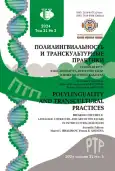Ilahi and Munajat in the Spiritual Musical and Poetic Culture of Turks and Tatars: On the Issue of Common Traditions
- Авторлар: Gilemyanova G.G.1
-
Мекемелер:
- G. Ibragimov Institute of Language, Literature and Art Academy of Sciences of the Republic of Tatarstan
- Шығарылым: Том 21, № 3 (2024): BREAKING THE CIRCLE: LANGUAGE, LITERATURE, AND ART OF THE TATARS IN INTERCULTURAL DIALOGUES
- Беттер: 583-590
- Бөлім: CULTURE AND ART
- URL: https://journal-vniispk.ru/2618-897X/article/view/326924
- DOI: https://doi.org/10.22363/2618-897X-2024-21-3-583-590
- EDN: https://elibrary.ru/PMXXBU
- ID: 326924
Дәйексөз келтіру
Толық мәтін
Аннотация
The paper raises the issues of the commonality of the spiritual chants of the Tatars and Turks - мunajats and ilahi. These problems are considered in the context of the religious musical and poetic traditions of the two Turkic peoples. The relevance of the study of this issue is due to the need to study Tatar culture as an integral part of Islamic civilization. The study of the general and local features of the existence of these genres helps to trace the continuity and evolution of traditions in different historical and cultural conditions. This study for the first time examines aspects related to understanding the place and role of ilahi and munajats in the spiritual culture of Turks and Tatars, identifying common features in the existence of these genres. The study was conducted on the basis of a comparative historical and comparative method.The article traces the parallels between the Turkish ilahi and the munajats of the Tatars, which are determined through a symbolic understanding of the divine, prayer and love for God through their expression through musical and poetic means, functions, themes, plots, forms and features of existence. The combination of common features makes it possible to further compare these genres both from the perspective of the common traditions of the spiritual culture of the two Turkic peoples, and to identify their local features.
Негізгі сөздер
Авторлар туралы
Gulnaz Gilemyanova
G. Ibragimov Institute of Language, Literature and Art Academy of Sciences of the Republic of Tatarstan
Хат алмасуға жауапты Автор.
Email: golnaz-kazan@mail.ru
ORCID iD: 0009-0000-5228-0540
SPIN-код: 2620-8286
Researcher
12/4 K. Marksa St, Kazan, 420111, Russian FederationӘдебиет тізімі
- Khisamov, N.Sh. eds. 1999. Medieval Tatar literature (VIII–XVIII centuries). Kazan: Fan publ. Print. (In Russ.)
- Abdulvapov, N.R. 2018. “Features of the genre of poetic prayer “munajat” on examples from Crimean Tatar poetry XV–XIX centuries.” Issues of Crimean Tatar philology, history and culture, no 6, pp. 62–71. Print. (In Russ.)
- Muhsin, M. 2000. “Münacat.” In Encyclopedia of Islam of the Religious Foundation of Turkey. Vol. 31. Istanbul: TDV Islam Araştırmaları Merkezi. Print. (In Turkish)
- Uzun, M.İ. 2000. “Ilahi.” In Encyclopedia of Islam of the Religious Foundation of Turkey. Vol. 22. Istanbul: TDV Islam Araştırmaları Merkezi. Print. (In Turkish)
- Feldman, W. 2015. “The Musical ‘Renaissance’ of Late Seventeenth Century Ottoman Turkey: Reflections on the Musical Materials of Ali Ufki Bey (ca. 1610–1675), Hafiz Post (d. 1694), and the ‘Maraghi’ Repertoire.” In Greve, M. (eds.), Writing the History of Ottoman Music. Würzburg: Ergon Verlag. Print.
- Ateş, E. 2018. Cami musikisi [Music of the mosque]. İstanbul. Print. (In Turkish)
- Demirci, M. 2017. Türk din musikisinin 200ü. [Two Hundred Years of Turkish Religious Music] Ankara. Print. (In Turkish)
- Turabi, A.H. eds. 2021. Türk din musikisi [Turkish religious music] Ankara. Print. (In Turkish)
- Tuimova, G.R. 2008. Religious musical and poetic genres in the traditional music of the Crimean Tatars: mavlid and Ilahi: Cand. of Art History Thesis. Kazan: Print. (In Russ.)
- Valiullina, F. 2006. XVIII Gasyr Tatar ədəbiyaty. Poetry [Tatar literature of the 18th century. Poetry]. Kazan: Dom pechati publ. Print. (In Tatar)
- Makarov, G.M. 2016. “Music of Old Tatar written poetry as a component part of the medieval elite culture of the Volga-Kama region.” Music. Art, Science, Practice: Scientific Journal of the Kazan State Conservatory named after N.G. Zhiganov, no. 1, pp. 29–40. Print. (In Russ.)
- Sayfullina, G.R. 2017. “Tatar munajat: transformation of the genre.” Music of the peoples of the world. Problems of study, vol. 2, pp. 219–234. Print. (In Russ.)
- Makhmutov, M.I. 1993. Arabic-Tatar-Russian dictionary of loanwords. Vol. 1. Kazan: Iman publ. Print. (In Tatar)
- Bakirov, M.H. 2018. Tatar folklore. Kazan: Publishing of the Academy of Sciences of the Republic of Tatarstan. Print. (In Russ.)
- Khosnullin, K.M. 2001. Munazhaty and baity. Kazan: Rannur publ. Print. (In Tatar)
- Sibgatullina, A.T. 2000. Sufism in Tatar literature (origins, themes and genre features): Dr. of Philol. Sciences Thesis. Elabuga. Print. (In Russ.)
- Sofiyskaya, A.B. 2007. Musical aspects of the religious holidays of the Tatar-Muslims of the Volga region: Cand. of Art History Thesis. Kazan. Print. (In Russ.)
- Sayfullina, G.R. 2007. “Vaisel-Karani on the Kazan land.” Gasyrlar avazy [Echo of centuries] no. 1, pp. 197–201. Print. (In Russ.)
Қосымша файлдар









